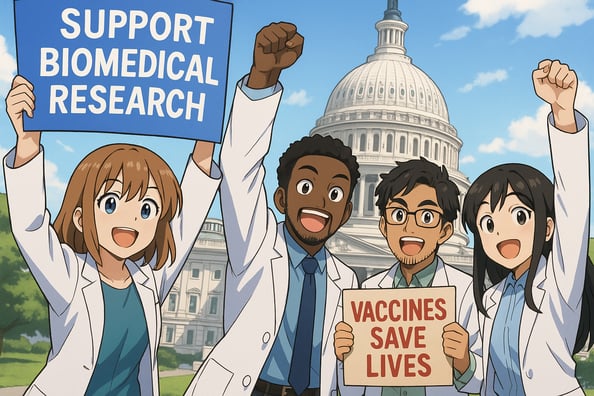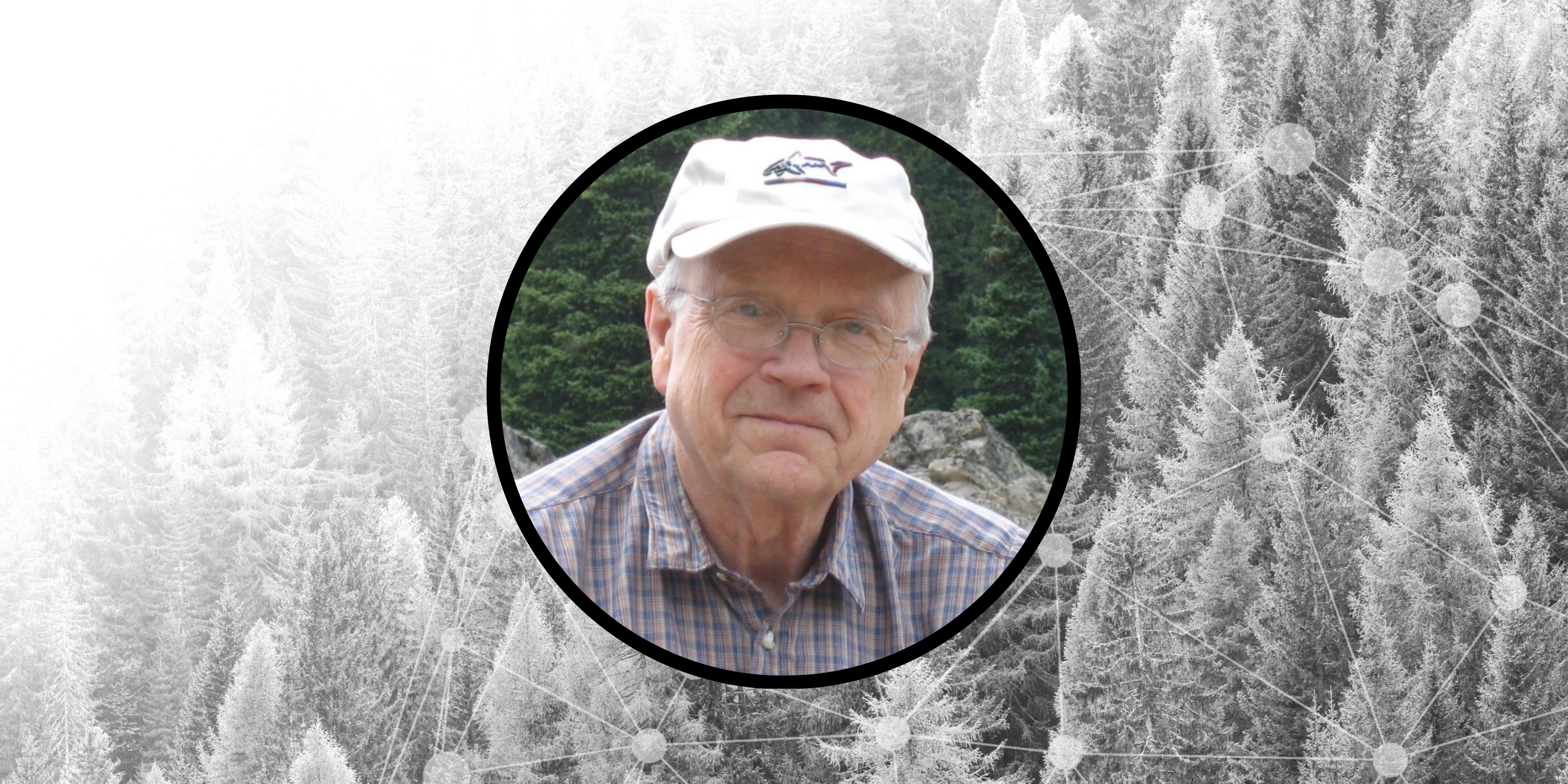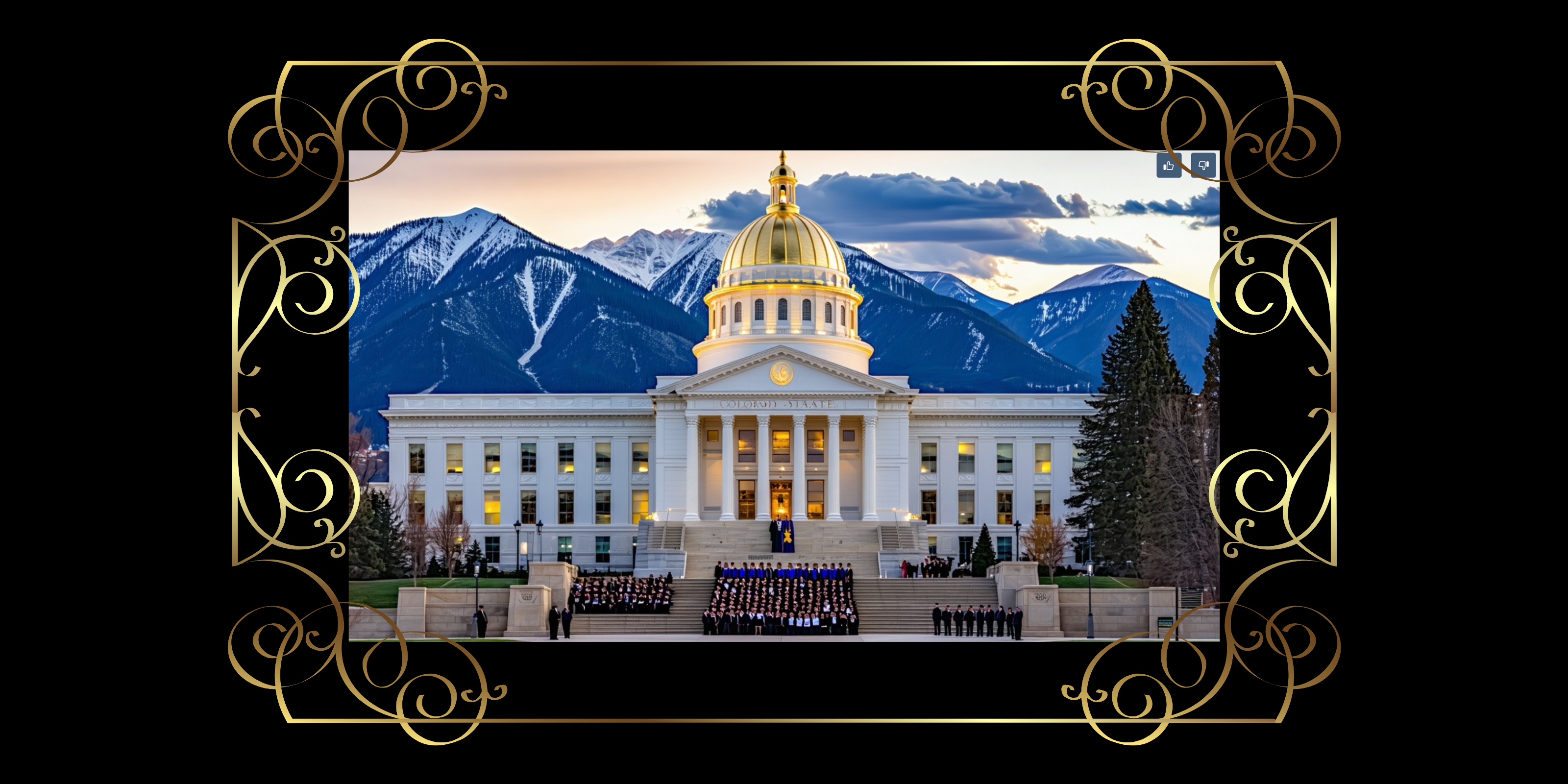Science Advocacy at Keystone Symposia’s Vaccinology Meeting in Washington D.C.
By Emma Wabel
Innovations in biotechnology and advancements in medical treatments depend on foundational discoveries from basic and translational researchers. Key findings such as therapeutic targets, pathological agents, and toxic compounds are first identified by basic research primarily supported by public funding before being picked up and commercialized by industrial companies. The current political climate surrounding scientific research directly threatens scientific progress that drives medical advances on which we all rely for our health.
The new administration has cut $2.7 billion appropriated by Congress for NIH research in the 2025 fiscal year, with more severe cuts proposed for the 2026 fiscal year. Institutions are facing budget cuts that slow or halt scientific progress, and individual researchers have had multi-year grants withdrawn, particularly those with focuses on disease diversity and infectious diseases. At the level of the National Institutes of Health, several training grants have been discontinued, diminishing opportunities for the rising pool of young scientists and limiting the number of bright minds who will eventually contribute to scientific and medical innovations.
One of the most powerful ways researchers can bolster public and political support for science when progress is threatened, is by communicating the importance of their science to the public and to policymakers. Today, science advocacy is critical, particularly in the field of vaccinology where misinformation and misunderstanding is rampant. Every day we see how this is eroding trust, progress and the global health advances that have been made by this field over many decades. As such, during Keystone Symposia’s annual conference on Vaccinology: Horizon's Across Disease, Demography & Technology, held in Washington D.C. on June 4-7, the organization sought to link science advocacy experts with scientists in attendance in an effort to empower scientists to self-advocate.
Now Available for On Demand Viewing!
Dr. Peter Hotez of Baylor College of Medicine joined as the keynote speaker, highlighting the importance of moving vaccine research forward in times when public distrust in science prevails. In addition, Dr. Joseph Laakso, science advocacy expert and Director of Science Policy at The Endocrine Society, ran a booth at the conference to educate attendees on the importance of science advocacy, and enlighten them as to how they can get involved. The symposium brought 230 attendees from around the world across basic science, clinical, government and industry sectors to collaboratively drive innovations in vaccine development for infectious and non-infectious diseases, including cancer and chronic degenerative diseases. Engaging scientists across these various sectors of research in science advocacy will be critical to impacting political and funding decisions as a united front.
Below we catch up with Dr. Joseph Laakso about his experiences in science communication and advocacy at The Endocrine Society, the importance of bolstering support for science funding in the current political climate and his experience interacting with scientists at the meeting.

Q&A with Science Advocacy Expert Dr. Joe Laakso
♦
 What is your job at The Endocrine Society? How did you decide to get into the field of advocacy work?
What is your job at The Endocrine Society? How did you decide to get into the field of advocacy work?
As Director of Science Policy at The Endocrine Society, my job includes positioning our members to serve as the voice of the field. I help prepare members to engage with policymakers at the federal level on issues that are most important to our medical and scientific communities.
My motivation for this work comes from my experience as a postdoc on the intramural campus at NIH. Working there, I saw directly how decisions made by Congress affected both the conduct of research and how research outputs can reach communities around the world.
What was your role at this symposium? What did you hope to contribute to the meeting?
I attended the Keystone Symposia Conference on Vaccinology because the subject of vaccines and vaccination requirements are attracting attention from policymakers. It is critical that scientists who are active in the field are able to tell the story of their research. My role at the conference was to provide options for scientists who wanted to share information with their elected representatives and support federal funding for medical research.
Why is it important for scientists to be involved in advocacy?
Scientists need to be advocates for their work because the federal government is the largest source of funding for research in the United States. Lawmakers’ time is often limited, and they have many other issues competing for their attention, but medical research on vaccinology is vital for public health.
Congress needs to hear from scientists themselves about the public health impacts of their work. When researchers can explain their work to the public, policymakers can understand and appreciate what taxpayers’ investments are producing.
How did scientists react to your booth at the meeting? What types of questions and comments did you hear?
Attendees at the conference were curious about advocacy and how they could make a difference given the challenging fiscal environment for research. The most common question I received was whether or not e-mailing Congress truly made a difference. A steady drumbeat of constituents calling and emailing ensures that a representative will keep NIH front and center when discussing their priorities with other members of Congress.
Constituents sending e-mails or calling the office of their representatives is one of the most important and effective things that we all can do as citizens. Medical research is a longstanding bipartisan priority because of the grassroots support it generates.
What was your overall impression of the meeting and the scientific community?
I was truly impressed by how clearly scientists were able to explain the public health benefit of their work and how they are driving the science of vaccines forward. I was not terribly familiar with the field, and I appreciated that several poster presenters took the time to explain their work to me.
I look forward to seeing what this extraordinary scientific community produces in the coming years!
The demand for science advocacy grows as scientific research continues to face threats and cuts to research funding. Those fighting for science at the policy level are working hard to have their voices heard, and the impact can be seen in Congress’ actions. Recent news articles detail how Congress is urging the administration to ensure that funds appropriated for medical research are disbursed as originally intended by Congress.
For those interested in getting involved in science advocacy, there are many ways to have your message heard:
- Often, the most effective way to begin is by contacting your congressional or senate representatives to express concerns about the state of research funding. Personal stories about the effects of Congressional funding decisions on research progress, which will impact their communities in terms of public health and medicine, are most compelling to policymakers.
- The Endocrine Society provides a platform from which advocates can customize a template letter to their representative.
- The American Society for Cell Biology provides a step-by-step guide to calling your representatives, complete with an example script to start the conversation.
- The American Association for the Advancement of Science (AAAS) provides guidance on a host of ways researchers can advocate for their science as well.
While many scientists feel helpless in the current political climate, it is important to remember that by working together, scientists can make an impact on the local and national level. Now is the time to lean into science advocacy and take an active role in promoting science in the public and political eye. By driving the conversation, the community can ensure a strong future for science.
Stay tuned for more science advocacy efforts and initiatives from Keystone Symposia!
Meet the Author

Emma Wabel

Related news
Honoring Keystone Symposia Founder Charles Frederick Fox
It is with great sadness that we mourn the passing of Keystone Symposia’s founder, Charles...
Colorado State Capitol Tribute to Keystone Symposia
On Monday March 3, Keystone Symposia was recognized by the Colorado State Senate and House of...
Keystone Symposia ON DEMAND!!!
Now you can access the latest scientific discoveries and directions from the comfort of your own...






